What goes on in Poland on the 15th of March.
Ember warns against Poland becoming dependent on another fossil fuel
Experts from the Ember think tank have calculated on the basis of the Polish Energy Policy until 2040, that Poland is planning the largest increase in gas use in the entire EU. They also claim that Warsaw may undermine the EU target of reducing CO2 emissions, and ignores the potential of photovoltaics, although the installed capacity has already exceeded 4 GW.
According to Ember’s analysts, the strategic energy document, although it assumes that in 2040 Poland may reduce the share of coal to 11 percent (today it is 70 percent) in the energy mix when CO2 allowances are expensive, shows lack of ambition to move away from coal, which may be a threat to the EU’s target of reducing CO2 emissions by 55 percent by 2030 compared to 1990.
Ember also notes that Poland is betting on gas, although in the EU it is supposed to be a transition fuel (Dolna Odra power plant is building gas blocks instead of coal ones, the Ostrołęka C coal project has been cancelled, but it may be replaced by gas). Poland plans the largest increase in natural gas consumption in the entire European Union – from 14 TWh in 2019 to 54 TWh in 2030. It is also a significant increase in relation to its previous plans, which assumed an increase in generation from gas to only 21 TWh. By 2030, Poland will therefore become the third largest gas energy producer in the EU – which, according to Ember, is “quite unusual for a country that does not have significant natural gas resources”. Poland imports most of its gas, although less and less from Russia thanks to the supplies of LNG to the terminal in Świnoujście, the vast majority of the raw material still comes from abroad and these trends will not change. Analysts point out that this way Poland exposes itself to the risk of gas price volatility, as well as additional costs related to charges for gas leaks, the introduction of which has been hinted at by the European Commission.
According to the analysts, Poland’s Energy Policy until 2040 (energy strategy – editor’s note) also underestimates renewable energy sources (RES), especially photovoltaics, which is developing dynamically. The document assumes that the installed capacity of solar energy in 2040 will amount to 10-16 GW (this is a wide range), while today it is over 4 GW (PEP2040 assumes 5.1 GW by 2025).

 PL
PL EN
EN





